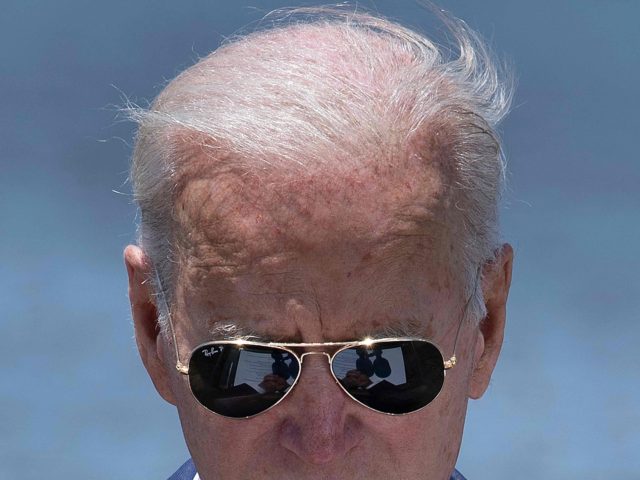President Joe Biden took an odd approach Thursday to the National Day of Prayer. He issued a proclamation in which he mentioned “racial injustice” and “climate change,” but neglected to mention “God.”
This is the same Biden who ran on a promise to fight for the “soul of our nation,” and whom the sycophantic media call “very Catholic.”
The National Day of Prayer offers a rare opportunity for Americans to unite. But Biden couldn’t manage it, placing politics above prayer.
More Americans believe that the country has become “more divided” (28%) than “more united” (23%), according to a new poll released this week. (The difference is outside the poll’s 4.7% margin of error.) And that is entirely due to the way that Biden has governed. Daniel Henninger of the Wall Street Journal observed this week that while Biden ran as the moderate alternative to socialist Sen. Bernie Sanders (I-VT), in practice Biden’s policies have been even more radical than Bernie’s.
Yet Biden still urges the country to “unite with purpose and resolve,” as he said in his (literally) Godless proclamation. By that, he means unity behind the Democrats’ radical policies.
That is why he went to Louisiana on Thursday — not to ask for Republican support for his infrastructure plan, the White House said, but to contrast his plan with what White House Deputy Press Secretary Karine Jean-Pierre caricatured as the Republicans’ preference for big tax cuts for rich people. That’s unity!
Given how Biden is corrupting the notion of unity, we ought to ask whether it is worth pursuing as an ideal at all. Let us examine the situation today in Israel, where the country has been mired in a political crisis for the past two years.
Prime Minister Benjamin Netanyahu failed to form a government this week. Former allies abandoned him, leaving him without a majority in the Israeli parliament, the Knesset, despite leading the largest party.
Netanyahu only has himself to blame: all he did last year was vaccinate most of the country; take out Iran’s nuclear facility at Natanz; reach historic peace deals with Arab and Muslim nations; and beat the OECD average on economic performance during the pandemic.
Actually, that’s quite a record.
And Netanyahu did it despite persistent political instability that has lasted more than two years.
In that period, Israel has held four separate parliamentary elections, either because no party could put together a governing coalition, or because a temporary unity government fell apart. Meanwhile, Israel’s “deep state” is pursuing criminal prosecutions against Netanyahu over charges so flimsy no one seems to be able to explain what he did wrong.
Israel has succeeded, regardless — not just because of Netanyahu’s leadership (though that was crucial), but also because Israeli society is fundamentally strong.
The country’s political debate is hopelessly acrimonious — worse, even, than the divisions in the U.S. But Israelis share basic values. Israel has strong public institutions, including the military. And Israelis are among the happiest people in the world. If anything, the pandemic brought Israelis together against a common threat.
There is a difference between national unity, and political unity.
They are not mutually exclusive, but one does not require the other.
President Biden devoted his Inaugural Address to the theme of “unity,” but in practice he has governed as if Republicans did not exist. He has gone more than 100 days in office without meeting with the top Republican leadership in both houses of Congress. His idea of “unity” is clearly that Republicans ought to capitulate to radical left-wing policies.
We have political “unity” of a sort in the fact that Biden’s party controls all of Washington. But look at the result.
Senate Democrats are forcing through massive spending bills on party-line “reconciliation” votes, and itching to end the 60-vote filibuster rule. House Democrats have passed legislation to take over the country’s election system. The judiciary is still nominally independent — but some Democrats have proposed legislation to pack the Supreme Court with loyal justices.
America has often done better under divided government.
The most successful year of Donald Trump’s presidency was 2019, a year in which Democrats took control of the House and impeached him. Throughout that charade, Trump managed a growing economy that was creating large numbers of new jobs every month. He also began building the border wall, despite Democratic opposition; took out the leader of ISIS; and took on China in a trade war that barely dented the U.S. economy.
The problem we face today is that our political divisions are increasingly driving social divisions, which reinforce the political divides.
The Atlantic noted earlier this week that many liberal Americans are having trouble emerging from their homes as the population becomes vaccinated and the coronavirus lockdowns begin to ease. They are no longer following “science,” if they ever were. Rather, lockdowns became a political cause around which they reshaped their social lives.
When Biden governs as if America is a one-party state, but accuses the country of “systemic racism,” and encourages the “cancel culture” now rampant in social media, corporate boardrooms, and college classrooms, he is unraveling the basic social fabric that weaves our diverse nation together.
We need strong political opposition to stop Biden and his rampant Democrats so that Americans can return to our normal lives together, and protect the kind of unity that matters most.
Joel B. Pollak is Senior Editor-at-Large at Breitbart News and the host of Breitbart News Sunday on Sirius XM Patriot on Sunday evenings from 7 p.m. to 10 p.m. ET (4 p.m. to 7 p.m. PT). He is the author of the new e-book, We Told You So!: The First 100 Days of Joe Biden’s Radical Presidency. His recent book, RED NOVEMBER, tells the story of the 2020 Democratic presidential primary from a conservative perspective. He is a winner of the 2018 Robert Novak Journalism Alumni Fellowship. Follow him on Twitter at @joelpollak.

COMMENTS
Please let us know if you're having issues with commenting.